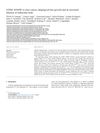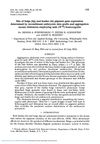 1 citations,
January 2022 in “Research Square (Research Square)”
1 citations,
January 2022 in “Research Square (Research Square)” CRISPR/Cas9 editing in spinach affects root hair growth by altering specific genes.
[object Object]  December 2022 in “American journal of medical genetics. Part A”
December 2022 in “American journal of medical genetics. Part A” A person got uncombable hair syndrome from two copies of chromosome 1 from their mother.
 October 2022 in “Journal for Research in Applied Sciences and Biotechnology”
October 2022 in “Journal for Research in Applied Sciences and Biotechnology” Certain changes in the SHBG gene may increase the risk of PCOS in Iraqi women.
 May 2015 in “Journal of Dermatological Science”
May 2015 in “Journal of Dermatological Science” Researchers found a new area on chromosome 2 linked to a genetic hair loss condition.
 42 citations,
October 2009 in “The journal of investigative dermatology/Journal of investigative dermatology”
42 citations,
October 2009 in “The journal of investigative dermatology/Journal of investigative dermatology” Mutations in the KRT85 gene cause hair and nail problems.
7 citations,
February 2011 in “Journal of dermatology” The 736T>A mutation in the LIPH gene is common in Japanese people with autosomal recessive woolly hair.
20 citations,
July 2005 in “Experimental dermatology” The fuzzy gene is crucial for controlling hair growth cycles.
12 citations,
September 2014 in “Bone” A vitamin D receptor mutation causes rickets and affects immune responses.
7 citations,
August 2017 in “European journal of endocrinology” Mutations in the POC1A gene can cause a unique form of extreme insulin resistance and short stature.
 3 citations,
May 2019 in “BMJ case reports”
3 citations,
May 2019 in “BMJ case reports” A boy with severe immune deficiency and Epstein-Barr virus died from high-grade B-cell lymphoma.
 1 citations,
July 2022 in “Movement disorders clinical practice”
1 citations,
July 2022 in “Movement disorders clinical practice” A patient with Wilson's disease showed hair-pulling behavior as an initial symptom.
 134 citations,
June 2005 in “Neuropsychopharmacology”
134 citations,
June 2005 in “Neuropsychopharmacology” GABRA2 gene variations impact alcohol response, and hair loss medication finasteride reduces some effects.
 97 citations,
March 2002 in “Molecular and cellular biology”
97 citations,
March 2002 in “Molecular and cellular biology” Mutant CDP/Cux protein causes hair defects and reduced male fertility in mice.
89 citations,
March 1996 in “Proceedings of the National Academy of Sciences” CD18-deficient mice developed psoriasis-like skin disease, useful for studying inflammatory skin disorders.
66 citations,
October 2002 in “Human molecular genetics online/Human molecular genetics” A gene mutation in mice causes skin defects and early death.
21 citations,
June 2009 in “Mammalian genome” A new mutation in the Hr gene causes hair loss in mice, similar to a human hair disorder.
14 citations,
May 2017 in “Journal of Investigative Dermatology” A rare gene mutation causes skin fragility and itching without affecting hair or nails.
 10 citations,
November 2018 in “Genetics in medicine”
10 citations,
November 2018 in “Genetics in medicine” Lack of cystatin M/E causes thin hair and dry skin.
 9 citations,
November 2019 in “Cell calcium”
9 citations,
November 2019 in “Cell calcium” The STIM1 R304W mutation in mice leads to bone changes and teeth hair growth.
8 citations,
December 2016 in “Hormone Research in Paediatrics” Tunisian children with hereditary vitamin D-resistant rickets showed improvement with calcium treatment, and new genetic mutations were identified.
7 citations,
February 2019 in “Veterinary medicine and science” An American Bully with a genetic skin condition improved significantly with specific topical treatments.
 7 citations,
September 2017 in “Scientific Reports”
7 citations,
September 2017 in “Scientific Reports” Mice with too much sPLA₂-IIA have hair loss and poor wound healing due to abnormal hair growth and stem cell depletion.
[object Object]  7 citations,
October 1985 in “Genetics Research”
7 citations,
October 1985 in “Genetics Research” Beige and leaden pigment genes act within melanocytes, affecting pigment patterns.
1 citations,
September 2021 in “Frontiers in genetics” A genetic mutation in the DCAF17 gene caused Woodhouse-Sakati syndrome in a Chinese patient from a related family.
 November 2024 in “Rheumatology Advances in Practice”
November 2024 in “Rheumatology Advances in Practice” Monitor for early signs of azathioprine toxicity and check blood counts regularly.
 October 2023 in “Journal of pharmaceutical investigation”
October 2023 in “Journal of pharmaceutical investigation” Finasteride dosages should be adjusted based on CYP3A5 genotype and liver function to avoid side effects.

Not having the gene PLAAT3 leads to fat loss, high insulin resistance, and abnormal fat levels in the blood due to a disruption in fat cell development and function.
 September 2019 in “The journal of investigative dermatology/Journal of investigative dermatology”
September 2019 in “The journal of investigative dermatology/Journal of investigative dermatology” Not having enough cystatin M/E protein causes less hair growth and dry skin.
 February 2019 in “bioRxiv (Cold Spring Harbor Laboratory)”
February 2019 in “bioRxiv (Cold Spring Harbor Laboratory)” The gene Prss53 affects hair shape and bone development in rabbits.
50 citations,
December 2005 in “European Journal of Immunology” RXRα is crucial for proper immune response and links diet to immune function.


















